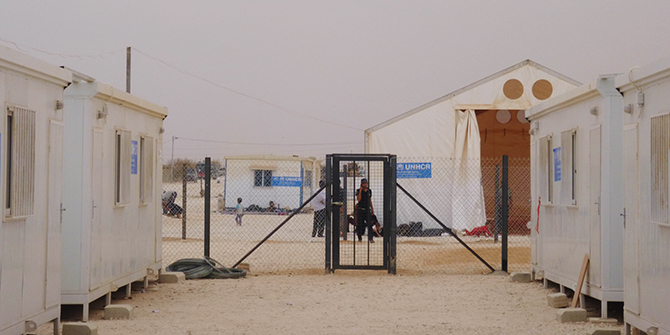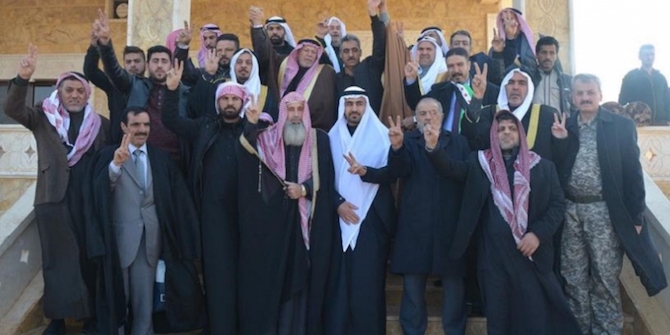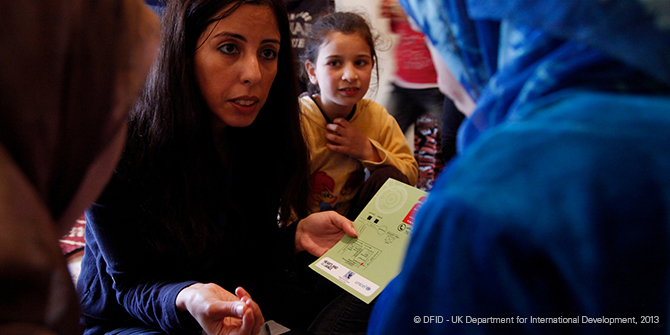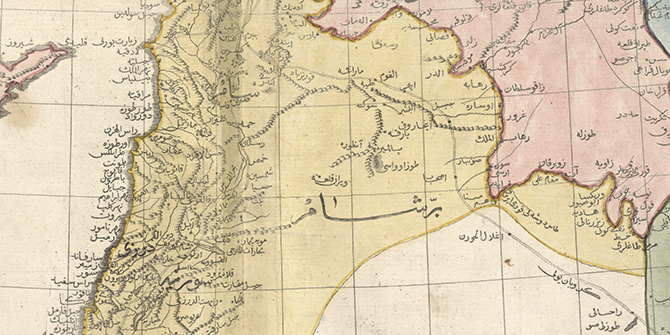by Géraldine Chatelard
#LSERefugees
This paper was presented at a workshop on ‘The Long-term Challenges of Forced Migration: Local and Regional Perspectives from Lebanon, Jordan and Iraq’ organised by the LSE Middle East Centre in June 2016. It was published as part of a collected papers volume available in English and Arabic.

The displacement of Syrians is now in its sixth year, and this long-term frame increasingly poses the question of whether refugees are in the position to provide for themselves autonomously, without depending on aid. Comparing different refugee populations in the same host country can cast light on the factors impacting refugees’ capacity to be more or less reliant on humanitarian providers, and help consider possible medium and longer-term trends in self-reliance and durable solutions. I propose looking at Jordan and comparing first, the expectations of Syrian and Iraqi asylum seekers and refugees – or persons of concern to UNHCR – with educational capital have towards UNHCR’s role in assisting them and helping find durable solutions, and second if refugees are able to use their educational qualifications to become self-reliant.
There are similarities and differences in the opportunity contexts of various refugee populations in Jordan, due in particular to the fact that their stay is governed by both a refugee and migration regimes, the former formalised through a Memorandum of Understanding (MoU) between UNHCR and the Government of Jordan (GoJ), the latter including residency and labour laws together with bilateral agreements between Jordan and the countries of origin of the migrants.
As a result of a number of combined factors, Syrians need to register with UNHCR and the Jordanian Ministry of Interior only if they want to access assistance and services available to asylum seekers. Even if they choose not to register, they do not need a residence permit to stay long-term in Jordan. As for Iraqis, their registration with UNHCR serves mostly as a conduit for resettlement or family reunification. Under the migration regime, a residence permit is compulsory for Iraqis, and can be acquired through financial capital or work contracts. Between 30 and 40 percent of those Iraqis registered with UNHCR also have residence permits.
The MoU between UNHCR and the GoJ does not envision local integration as a possible durable solution and does not mention refugees’ right to work. This does not mean that refugees do not work. The Jordanian law governing the labour of foreigners applies to Iraqis and Syrians regardless of their status with UNHCR. A number of professions, mostly non-qualified, are open to foreigners requiring an application for a work permit on the basis of a work contract. Syrian refugees have quickly looked for work opportunities, and about half of the households have at least one member engaged in some form of labour. In about two-thirds of the cases, however, this takes place through informal arrangements, without a contract or permit. The fact that Syrians work in the informal economy might not be a vulnerability factor in itself, considering that 44 percent of Jordanians also work informally. However, for Syrians, it carries serious risks: if they are caught without a work permit, they can be subjected to imprisonment and refoulement, or can be moved to refugee camps.
The proportion of refugees with educational qualifications is not marginal. 41 percent of Syrians registered with UNHCR have at least a secondary education, whereas 13 percent have a university degree. Anecdotal evidences show that the proportion of university graduates is higher among unregistered Syrians. As for Iraqis in Jordan, 50 percent of them had a university education in 2007, when the number of those registered with UNHCR was about as high as today. Jordanian labour requirements exclude from the work market most qualified non-Jordanian professionals. There are reasons for this exclusion: a large part of Jordanian graduates already cannot integrate in the work market and emigrate, mostly to Gulf countries, to access labour opportunities. This situation makes it very challenging for those Iraqis and Syrians who hold degrees to find jobs matching their qualifications.
In work on Iraqis in Jordan conducted before the arrival of Syrian refugees, I had noted that the majority of the former, highly educated but without enough financial capital to stabilise their stay in Jordan, were looking for avenues for secondary migration through refugee resettlement schemes, family reunion, legal migration channels or irregular migration, even when many would have preferred to stay in Jordan. This trend was compounded by the pull of family and other social ties from within distant diasporas that started reaching a critical mass during the 1990s …continue reading
Download the paper in English | Download the paper in Arabic
Géraldine Chatelard is Associate Researcher at the Institut Français du Proche-Orient, Amman.
Other papers in the series
- Syrian Refugees in Lebanon: A Turning Point?
Mireille Girard
- Syrian Refugees and the Kurdistan Region of Iraq
Hayder Mustafa Saaid
- The Informal Adaptive Mechanisms among Syrian Refugees and Marginalised Host Communities in Lebanon
Nasser Yassin & Jana Chammaa
- Relations Between UNHCR and Arab Governments: Memoranda of Understanding in Lebanon and Jordan
Ghida Frangieh
- The Syrian Humanitarian Disaster: Understanding Perceptions and Aspirations in Jordan, Lebanon and Turkey
Dawn Chatty
- The Syrian Refugee Crisis: A Global and Regional Perspective
François Reybet-Degat






